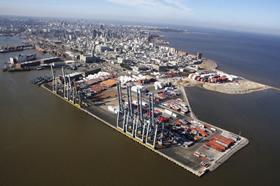
The future of the Cuenca de Plata container terminal at the port of Montevideo in Uruguay is under threat following a ban imposed by the Argentine government on Argentine exports being trucked to Montevideo for shipment overseas.
Belgian owner Katoen Natie said the situation was “highly worrying” as the volume of Uruguayan imports and exports alone was too low to guarantee the terminal’s viability in the future. “We’re awaiting the results of official negotiations, but it certainly doesn't make sense to run the port as a regional logistics centre as things stand currently,” said Fernando Correa, institutional relations manager at Katoen Natie. He added that the jobs on 350 workers employed directly at the terminal were also under threat.
The Belgian company estimates that the cessation of transhipment volumes will mean traffic will fall by 5,000 containers, equivalent to 25 per cent of the terminal’s total throughput.
A representative from the Argentine Chamber of Fruit Exporters (Cafi) said Montevideo, which until last season received a large proportion of the volume of fruit from Patagonia destined for overseas markets, was no longer an option for the region’s fruit exporters. Cafi is negotiating with the Argentine government to have the ban lifted.
The ban, which has been in place since October, stems from a row over the Uruguayan government’s decision to allow the Botnia/UPM paper mill to increase its annual production, which Argentina says will further pollute the river Uruguay which runs between both countries.
It is estimated that Argentine ports will benefit from an additional US$100m of business a year, which will be lost by Montevideo and another Uruguayan port, Nueva Palmira.



